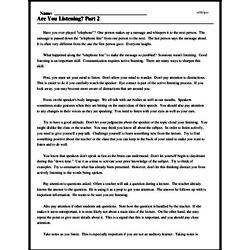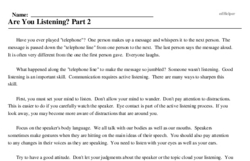Are You Listening? Part 2
Have you ever played "telephone"? One person makes up a message and whispers it to the next person. The message is passed down the "telephone line" from one person to the next. The last person says the message aloud. It is often very different from the one the first person gave. Everyone laughs.
What happened along the "telephone line" to make the message so jumbled? Someone wasn't listening. Good listening is an important skill. Communication requires active listening. There are many ways to sharpen this skill.
First, you must set your mind to listen. Don't allow your mind to wander. Don't pay attention to distractions. This is easier to do if you carefully watch the speaker. Eye contact is part of the active listening process. If you look away, you may become more aware of distractions that are around you.
Focus on the speaker's body language. We all talk with our bodies as well as our mouths. Speakers sometimes make gestures when they are hitting on the main ideas of their speech. You should also pay attention to any changes in their voices as they are speaking. You need to listen with your eyes as well as your ears.
Try to have a good attitude. Don't let your judgments about the speaker or the topic cloud your listening. You might dislike the class or the teacher. You may think you know all about the subject. In order to listen actively, you need to give yourself a pep talk. Challenge yourself to learn something new from the lecture. Try to find something positive about the teacher or the class that you can keep in the back of your mind to make you want to listen and to do well.



